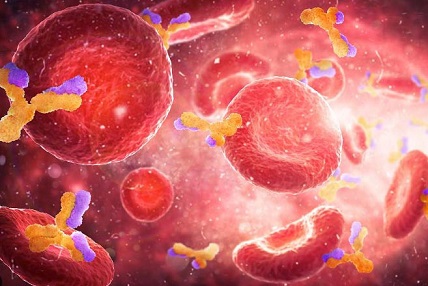Elevated globulin levels linked to protection against SARS-CoV-2 in bacterial pneumonia patients
Sebastian Lavoie Fact checked by:Thailand Medical News Team Sep 04, 2024 7 months, 3 weeks, 18 hours, 58 minutes ago
Medical News: In a fascinating recent study, researchers from Guangdong Pharmaceutical University and Sun Yat-Sen University in Guangzhou, China, have discovered that patients suffering from bacterial pneumonia with elevated globulin levels did not contract SARS-CoV-2, the virus responsible for COVID-19. The study, documented in the peer reviewed journal: Frontiers in Immunology, offers a groundbreaking perspective on the potential protective effects of elevated globulin levels against SARS-CoV-2, particularly in vulnerable populations such as those with bacterial pneumonia. This
Medical News report delves into the details of this study, exploring how elevated globulin levels might serve as a shield against the deadly virus.
 Elevated globulin levels linked to protection against SARS-CoV-2 in bacterial
Elevated globulin levels linked to protection against SARS-CoV-2 in bacterial
pneumonia patients
Background: The Unexpected Link
COVID-19, caused by SARS-CoV-2, has been a global challenge since its emergence in late 2019. As the virus spread rapidly worldwide, scientists and medical professionals scrambled to understand the factors that influenced infection and disease severity. The study highlights a new development in this ongoing research - how specific biological markers in patients with bacterial pneumonia might offer some protection against the virus.
Bacterial pneumonia is a common lung infection that can be caused by various bacteria, including Streptococcus pneumoniae, Staphylococcus aureus, Pseudomonas aeruginosa, and Klebsiella pneumoniae. The immune response to such infections is typically robust, involving both innate and adaptive immune systems. The role of globulin, a protein component of blood plasma, has been primarily associated with the immune system's ability to fight off infections. In this study, researchers observed that elevated levels of globulin in bacterial pneumonia patients might be more than just a response to bacterial infection - it might also offer protection against SARS-CoV-2.
Case Studies: Two Patients Defy the Odds
The research team reported on two elderly male patients who were hospitalized with severe bacterial pneumonia during the peak of the COVID-19 pandemic in Guangzhou, China. Both patients had elevated globulin levels and, despite being in a high-risk environment where SARS-CoV-2 was rampant, neither contracted the virus during their hospitalization.
Case 1: A 92-Year-Old Male
The first case involved a 92-year-old man who was admitted to the hospital on October 21, 2022, with a worsening cough and sputum production, symptoms consistent with bacterial pneumonia. The patient was found to be infected with Pseudomonas aeruginosa, Escherichia coli (CRE), and carbapenem-resistant Acinetobacter baumannii (CRAB). Despite receiving intensive care, including anti-infective therapy and mechanical ventilation, the patient ultimately succumbed to sepsis on January 8, 2023. Notably, throughout his hospitalization, his globulin levels remained elevated, and he never tested positive for SARS-CoV-2, despite the virus's widespread presence in the
hospital environment.
Case 2: An 82-Year-Old Male
The second case involved an 82-year-old man admitted on September 30, 2022, with a recurrent cough, sputum production, and shortness of breath. Diagnosed with bacterial pneumonia caused by carbapenem-resistant Klebsiella pneumoniae (CRKP) and Mycoplasma pneumoniae, the patient received ventilator-assisted care and various anti-infective treatments. He was discharged on October 26, 2022, only to be readmitted in November with similar symptoms. Despite these complications, and like the first patient, he did not contract SARS-CoV-2 during his hospital stay, and his globulin levels remained above the normal range throughout this period.
The Role of Globulin in Immunity
Globulin proteins play a critical role in the immune system, particularly in the production of immunoglobulins or antibodies that help fight infections. The researchers in this study hypothesize that the elevated globulin levels observed in the two patients may have provided them with a form of immunity against SARS-CoV-2. Specifically, they suggest that these immunoglobulins might have cross-reacted with the virus, neutralizing it before it could establish an infection.
This hypothesis is supported by the fact that globulin levels in both patients began to decrease after the lifting of strict COVID-19 control measures in Guangzhou, which exposed them to SARS-CoV-2. The researchers propose that this decrease could indicate that the immunoglobulins were used up in the process of fighting off the virus, thus preventing infection.
Expanding the Study: What Comes Next?
While the findings of this study are compelling, they are based on only two cases, which limits the generalizability of the results. The researchers acknowledge this limitation and call for further studies involving larger groups of patients to explore the relationship between globulin levels, bacterial pneumonia, and SARS-CoV-2 infection.
Future research could also investigate whether elevated globulin levels in other patient populations offer similar protective effects against SARS-CoV-2.
Additionally, the potential for using immunoglobulins from bacterial pneumonia patients as a therapeutic option for COVID-19 patients could be explored, especially given the ongoing challenges in managing the pandemic.
Conclusion: A New Avenue for COVID-19 Prevention?
The study's findings suggest that bacterial pneumonia patients with elevated globulin levels may be less susceptible to SARS-CoV-2 infection. This discovery opens up new avenues for research into COVID-19 prevention and treatment, particularly in high-risk patient populations. If further research confirms these findings, it could lead to innovative strategies for using immunoglobulins to protect against SARS-CoV-2.
The study findings were published in the peer-reviewed journal Frontiers in Immunology.
https://www.frontiersin.org/journals/immunology/articles/10.3389/fimmu.2024.1404542/full
This study not only provides hope for better understanding the complex interactions between different infections but also underscores the importance of continued research into the immune system's role in fighting off not just one, but multiple pathogens simultaneously. As scientists continue to unravel the mysteries of the immune system, discoveries like this may pave the way for more effective treatments and preventative measures in the future.
For the latest COVID-19 News, keep on logging to Thailand
Medical News.
Read Also:
https://www.thailandmedical.news/news/sars-cov-2-evades-mucosal-immunity-via-orf8-protein-downregulating-polymeric-ig-receptor-pigr-expression
https://www.thailandmedical.news/news/breaking-evidence-found-that-sars-cov-2-even-delves-into-the-skull-bones-of-those-infected
